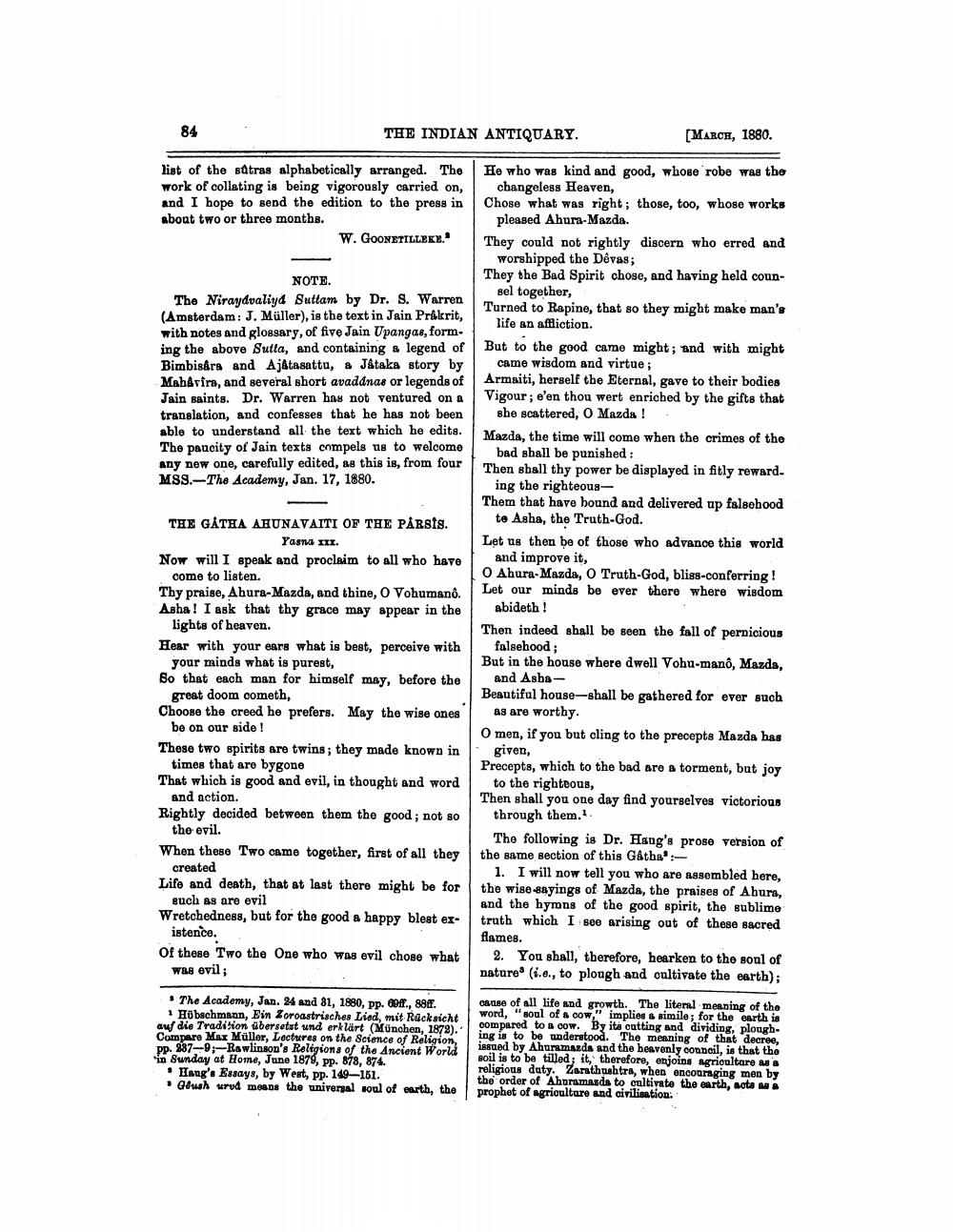________________
84
-
THE INDIAN ANTIQUARY.
[MARCH, 1880.
list of the stras alphabetically arranged. The work of collating is being vigorously carried on, and I hope to send the edition to the press in about two or three months.
W. GOONETILLERE
NOTE. The Niraydvaliyd Suttam by Dr. S. Warren (Amsterdam: J. Müller), is the text in Jain Prakrit, with notes and glossary, of five Jain Upangas, forming the above Sutta, and containing a legend of Bimbisåra and Ajátasattu, a Játaka story by Mahavira, and several short avaddnas or legends of Jain saints. Dr. Warren has not ventured on a translation, and confesses that he has not been able to understand all the text which he edits. The paucity of Jain texts compels us to welcome any new one, carefully edited, as this is, from four MSS.-The Academy, Jan. 17, 1880.
THE GÅTHA AHUNAVAITI OF THE PÅRSIS.
Yasna III. Now will I speak and proclaim to all who have
come to listen. Thy praise, Abura-Mazda, and thine, 0 Vohumano. Asha! I ask that thy grace may appear in the
lights of heaven. Hear with your ears what is best, perceive with
your minds what is purest, Bo that each man for himself may, before the
great doom cometh, Choose the creed he prefers. May the wise ones
be on our side! These two spirits are twins; they made known in
times that are bygone That which is good and evil, in thought and word
and action. Rightly decided between them the good ; not so
the evil. When these Two came together, first of all they
created Life and death, that at last there might be for
such as are evil Wretchedness, but for the good a happy blest ex
istence. of these Two the One who was evil chose what
Was evil;
He who was kind and good, whose robe was the
changeless Heaven, Chose what was right; those, too, whose works
pleased Ahura Mazda. They could not rightly discern who erred and
worshipped the Devas; They the Bad Spirit chose, and having held coun
sel together, Turned to Rapine, that so they might make man's
life an affliction. But to the good came might; and with might
came wisdom and virtue; Armaiti, herself the Eternal, gave to their bodies Vigour; e'en thou wert enriched by the gifts that
she scattered, O Mazda! Mazda, the time will come when the crimes of the
bad shall be punished: Then shall thy power be displayed in fitly reward.
ing the righteousThem that have bound and delivered up falsehood
te Asha, the Truth-God. Let us then be of those who advance this world and improve it,
Ahura Mazda, 0 Truth-God, bliss-conferring! Let our minds be ever there where wisdom
abideth! Then indeed shall be seen the fall of pernicious
falsehood; But in the house where dwell Vohu-mano, Mazda,
and AshaBeautiful house-shall be gathered for ever such
as are worthy. O men, if you but cling to the precepts Mazda has
given, Precepts, which to the bad are a torment, but joy
to the righteous, Then shall you one day find yourselves victorious through them."
The following is Dr. Haug's prose version of the same section of this Gatha:
1. I will now tell you who are assembled here, the wise sayings of Mazda, the praises of Ahura, and the hymns of the good spirit, the sublime truth which I see arising out of these sacred flames.
2. You shall, therefore, hearken to the soul of nature (1.e., to plough and cultivate the earth);
The Academy, Jan. 24 and 81, 1880, pp. 60ff., 88ff. 1 Hübschmann, Ein Zoroastrisches Lied, mit Rücksicht auf die Tradision übersetet und erklärt (München, 1872). Compare Max Müller, Lectures on the Science of Religion, pp. 237-9;-Rawlinson's Religions of the Ancient World in Sunday at Home, June 1879, pp. 878, 874.
• Hang's Essays, by West, pp. 149–151. • Glush urud means the universal soul of earth, the
cause of all life and growth. The literal meaning of the word, "soul of cow," implies & simile; for the earth is compared to a cow. By its cutting and dividing, ploughing is to be understood. The meaning of that decree. issued by Ahuramazds and the heavenly council, is that the soil is to be tilled; it, therefore, enjoins Agricultare a religious duty. Zarathushtrs, when encouraging men by the order of Ahurama da to cultiyate the earth, acta mas prophet of agricultore and civilisation:




